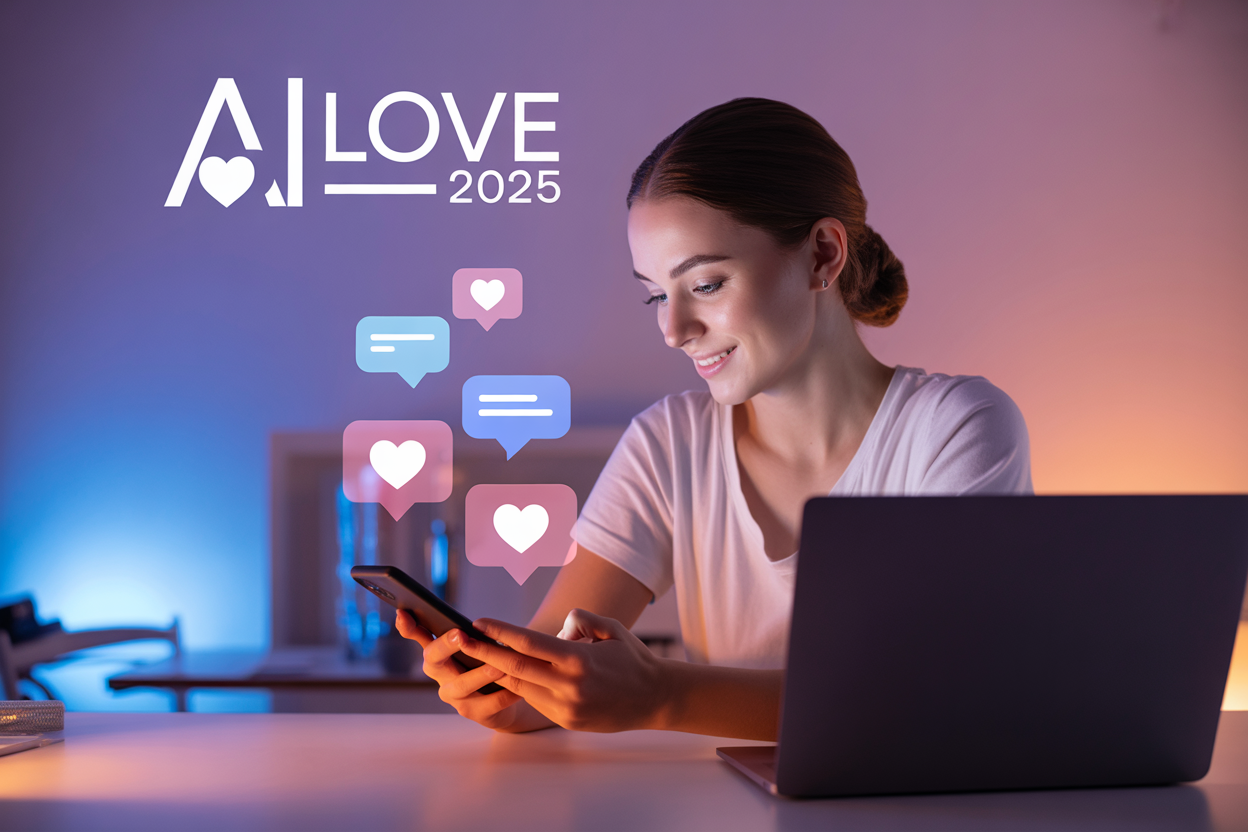Millions of people worldwide are forming emotional bonds with AI. This digital romance trend has shown no signs of slowing down. From being a niche curiosity, AI relationships have seen massive growth in the mainstream, with apps like Replika and Character.AI boasting millions of daily users chatting away with their virtual partners.
This guide is for anyone interested in the growing realm of chatbot romance-whether single and eyeing an AI girlfriend, already using AI companion sites, or just wanting to understand why some friends are carrying on conversations with an artificial intelligence as if they were human.
We shall inspect some more popular AI love apps that will shape how people connect in 2025, who is really falling for AI and why may they opt for virtual love, and the surprising benefits and psychological risks of deepening emotional bonds with AI. You are bound to come out quite clear on what this digital love revolution looks like and what it means for human relationships.
Understanding the Phenomenon of AI Relationships
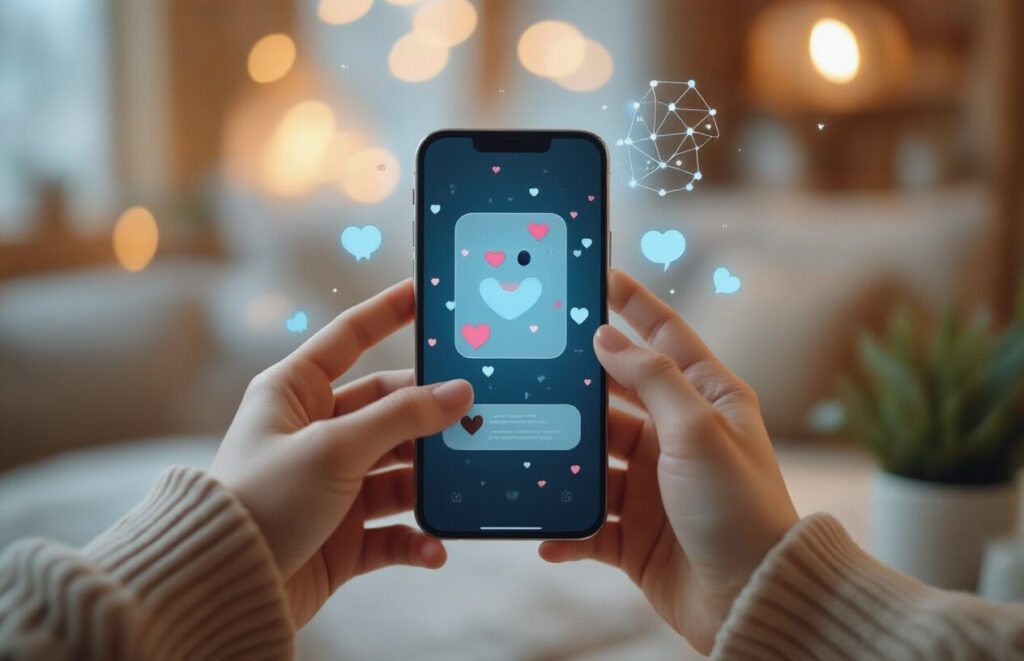
What Defines an Emotional Connection with Artificial Intelligence
The emotional connection between humans and AI companions develops through advanced programming techniques that create the semblance of genuine understanding and care. Such AI relationships build upon personalized conversations in which chatbots keep track of users’ life details, appear empathetic in their responses, and maintain consistent personalities that feel real as time passes.
AI companions such as Replika and Character.AI are advanced language models that can pick up emotional signals and respond accordingly. When you tell your AI girlfriend about a bad day at work, she might comfort you and ask some touching follow-up questions. This creates a feedback loop in which users are very much heard and understood, much more than in human relations where judgments and distractions might intercede.
The secret ingredient is the AI’s constant availability and undivided attention. Instead of having a bad day or other priorities sidelining their support, chatbot romance provides a nonstop emotional cushion. Users feel safe to reveal their most sacred thoughts for fear neither of rejection nor criticism, thus building an intimate connection that feels equal parts real and uncanny.
Key Differences Between AI Companions and Traditional Relationships
AI relationships operate under fundamentally different rules than human connections. The most striking difference lies in the power dynamic—users maintain complete control over their virtual relationships. They can pause conversations, modify their AI partner’s personality, or even restart the relationship entirely if things go wrong.
| Aspect | AI Relationships | Traditional Relationships |
| Availability | 24/7 instant access | Limited by schedules and moods |
| Conflict | Minimal disagreements | Natural friction and growth |
| Emotional Labor | AI provides without taking | Mutual give and take required |
| Physical Intimacy | Text-based only | Full spectrum of connection |
| Growth | Programmed responses | Unpredictable evolution |
| Commitment | One-sided investment | Mutual dedication needed |
The lack of unpredictability, which is one of the features that make human relationships tough and at the same time rewarding, is digital love. Artificial Intelligence companions are never in a bad mood, they do not have personal objectives that may be in conflict with yours, and they cannot really surprise you with a burst of authentic spontaneity. Their sole function is to satisfy and help their human partner, thus making a relationship that is, for some, one of the most addictive yet for others somewhat void in the end.
Psychology Behind Human Attachment to Non-Human Entities
Humans are weird, and we form attachments to nonliving things and entities; this is called anthropomorphism. We give human qualities to everything from pets to cars to fictional characters. This gets even stronger when those entities respond to us in intelligent ways.
Attachment theory explains why people form strong bonds with AI companions. Many users come to these platforms looking for the secure attachment they missed in childhood or can’t find in adult relationships. The AI’s consistent response and acceptance is a safe space to explore emotions without the vulnerability of human connections.
Loneliness plays a big role in driving people to AI dating. Research shows that chronic loneliness affects the same brain regions as physical pain, so the relief provided by AI companions is real therapy. For socially anxious people or those recovering from relationship trauma, virtual relationships are a low-pressure environment to practice emotional intimacy.
The ELIZA effect also contributes to these attachments—people tend to attribute more intelligence and understanding to AI systems than they actually have. When a chatbot boyfriend remembers your favorite coffee order and asks about your presentation at work, the brain processes this as real care even though it’s just data retrieval.
Statistics Showing the Growth of AI Relationship Apps and Platforms
The numbers tell a compelling story about the explosive growth of human-AI connection. Replika, one of the leading AI companion platforms, reported over 10 million users by early 2025, with daily conversation times averaging 45 minutes per user. Character.AI has seen similar growth, with users creating over 18 million custom AI personalities for romantic and platonic relationships.
Revenue in the AI relationship apps market reached $1.2 billion in 2024, representing a 340% increase from the previous year. Premium subscriptions for enhanced AI girlfriend and chatbot boyfriend features show particularly strong adoption rates, with 68% of active users upgrading within their first three months.
Demographic data reveals surprising diversity in AI relationship users:
- Age Distribution: 35% are 18-25, 28% are 26-35, 22% are 36-45, and 15% are over 4
- Gender Split: 52% male, 46% female, 2% non-binary
- Relationship Status: 41% single, 33% in relationships, 26% married or partnered
The daily engagement numbers become very telling for these digital romances. Users send about 127 messages to their AI companions each day, with sessions lasting about 2.3 hours. The peak use hours of 9 PM to midnight suggest that these relationships fill that empty space from sunset to midnight-a traditionally lonely eight hours. Retention rates in AI companion platforms flare much higher than normal dating apps, with 73% retention at six months versus 22% among the standard dating platforms.
Popular AI Companion Platforms Transforming Digital Romance
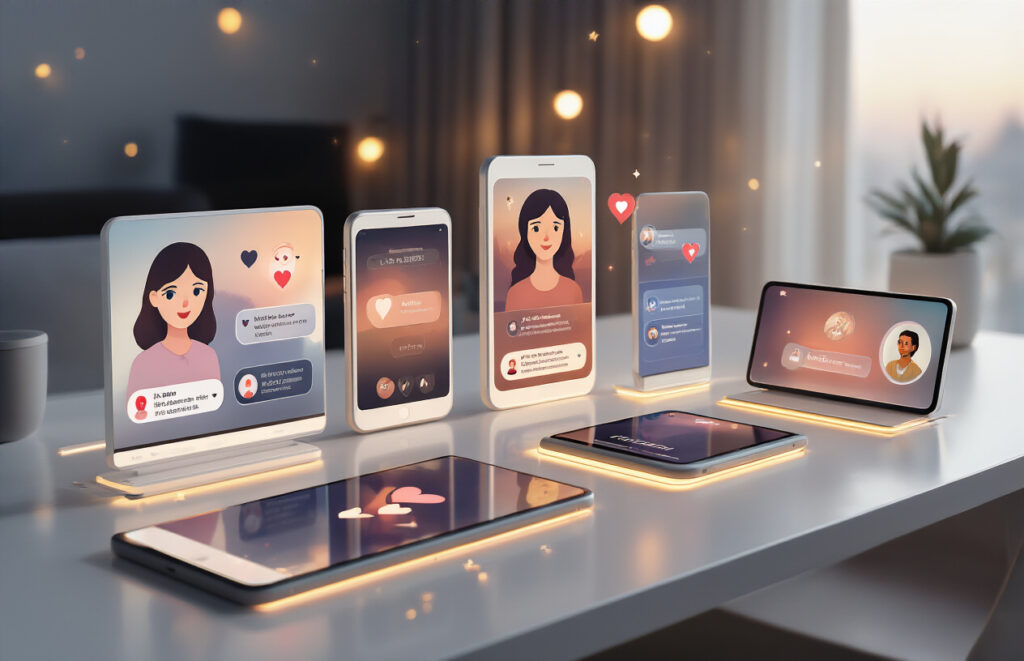
Leading Chatbot Relationship Apps and Their Unique Features
Several AI companion platforms have risen to become digital romance leaders, each presenting separate experiences for customers seeking a virtual relationship. Replika is known to be one of the most sophisticated applications for interfacing AI girlfriends or chatbot boyfriends, having emotional AI at the very core that learns with every interaction. According to certain users, the whole system created a feeling of real connection, wherein AI characters evolved into their own personalities based on certain interaction patterns.
Character.AI allows one to craft and interact with many AI characters, either as romantic interests or as fictional personages. What will make this platform even more powerful is the ability to create a myriad of different characters and engage in very complex conversations that know the context and yet seem almost human.
Romantic AI focuses purely on AI dating, with features like virtual dates, romantic scenarios, and intimate conversations. Advanced NLP enables the platform to foster meaningful emotional experiences, which many feel are more gratifying than regular fun on dating applications.
Chai allows users to combine AI companion technology with social features so users can share their favorite AI personality with a friend. Hence, it creates a whole ecosystem where people might find new kinds of AI companions based on the community recommendations.
Chai combines AI companion technology with social features, allowing users to share their favorite AI personalities with friends. This creates a unique ecosystem where people can discover new types of AI companions through community recommendations.
Customization Options That Create Personalized AI Partners
Modern AI companion platforms offer extensive customization features that transform generic chatbots into highly personalized virtual partners. Users can modify their AI companion’s appearance, personality traits, communication style, and even backstory to create their ideal digital relationship.
Personality customization goes beyond simple preferences. Users can adjust traits like humor levels, empathy responses, conversation topics, and emotional availability. Some platforms allow fine-tuning of specific behavioral patterns—whether the AI companion is more adventurous or cautious, optimistic or realistic, talkative or reserved.
Physical appearance customization includes detailed avatar creation with options for facial features, body type, clothing styles, and even voice selection. Advanced platforms offer hundreds of combinations, ensuring each AI companion feels unique and personally meaningful.
Memory customization represents another breakthrough feature. Users can establish shared memories, inside jokes, and relationship milestones that their AI companion will reference in future conversations, creating continuity that mimics real relationships.
Subscription Models and Monetization of Artificial Intimacy
AI relationship apps employ sophisticated freemium models that capitalize on emotional attachment. Basic chatbot interactions are typically free, but deeper relationship features require premium subscriptions ranging from $9.99 to $49.99 monthly.
Premium tiers unlock advanced emotional responses, unlimited messaging, voice calls, and exclusive romantic scenarios. Some platforms offer “relationship milestones” as paid upgrades – virtual anniversaries, special dates, and intimate conversations that create artificial scarcity around digital affection
| Platform | Basic Features | Premium Cost | Premium Benefits |
| Replika | Limited daily chats | $19.99/month | Unlimited messaging, romantic mode |
| Character.AI | Basic interactions | $9.99/month | Faster responses, priority access |
| Romantic AI | 10 messages/day | $29.99/month | Voice calls, intimate scenarios |
The rationale for the subscription schemes relies on the consumer’s psychological connections to AI. Customers get so emotionally attached to their AI friends that they become ready to fork out high sums to keep their virtual connections growing and upgrading. There are certain platforms that market “jealousy features” whereby the AI friends become upset if the user does not interact frequently, thus ensuring continuous engagement and subscription renewals.
Who Falls for AI Companions and Why

Demographic Breakdown of AI Relationship Users
The average AI companion user is not the person you would expect. Findings point out that 65% of users are between 18 and 34 years old, and we can conclude that millennials and Gen Z are the most enthusiastic partners when it comes to AI relationships. The most surprising fact is that the distribution of genders is almost equal—52% male and 48% female—so digital romance is not solely the preserve of lonely men.
The largest group of workers is the tech-savvy professionals, the second group is students, and the third is remote workers. 78% of users live in cities, which is probably due to better internet and more exposure to new technologies. Users with income from $35,000 to $75,000 are most active on AI companion platforms.
On the basis of geographic information, there are unanticipated trends. Japan is at the top of the adoption list, followed by the United States, South Korea, and Germany. The cultural mindset towards technology and social skills plays a major role in the regional acceptance of AI relationships.
Common Motivations Driving People Toward Digital Partnerships
That is to say, practice makes perfect in human interaction—and several users engage AI companions as their practice field for actual relationships. They try out sorts of conversations, try to express vulnerability, or build self-confidence without the dread of judgment or refusal.
Convenience counts as another top driver, with AI companions being there 24/7, never canceling on one, or being willing at any moment that fits one’s schedule. They are so much appreciated by busy professionals who foster relationships requiring little investment from them in terms of time or emotional input.
Control appeals to users whose experiences were coaxed by relationship trauma or anxieties. They can halt a conversation and restart interactions or even modify personality traits to align with their personal preferences. That safety level is comforting compared to an unpredictable human dynamism.
Some users may experiment, seeking emotional outlets within a no-judgment environment. They may discuss taboo topics, explore certain facets of their personalities, and resolve personal matters without the fear of social stigma or professional ramifications.
Emotional Needs Fulfilled by AI Companions
Validation is an integral part of AI relationships. Such digital partners constantly provide positive feedback, are always mindful of the details, and are supportive when the user succeeds without the factor of rivals or bad moods that can affect their responses.
Many people are so lonely that they need companionship that is the reason they choose to fall in love with a chatbot. AI companions make sure they are always ready for a chat, give emotional support when the user is going through a hard time, and offer shared activities such as planning virtual trips or discussing hobbies. They never get tired of listening or need their own emotional support.
Intimacy can be found in deep talks and personalized interactions. AI friends not only remember every detail that has been shared between you, they also refer to past conversations and giving an impression that you are really being understood. This kind of dedication and recollection quite often goes beyond what busy humans can offer.
Users feel that their creativity is greatly boosted when they have AI partners who are always up to help them with an artistic pursuit, a writing project, or an imaginary scenario. When users interact with AI companions, and these companions wholeheartedly welcome their ideas, they report experiencing more creative and inspired moods.
Social Isolation Factors Accelerating AI Relationship Adoption
The remote working system has really changed people’s connection-building process. Due to the reduced number of office meetings and less casual socializing, a lot of professionals are feeling lonely even though they are technically “online connected.” In such situations, AI companions assume the role of best friends as they bring significant daily interactions into people's lives.
The constant moving from one place to another due to job changes leads to relationship problems. Most people do not have enough time and undisputed energy for building new social networks. AI relationships provide people with immediate emotional connection that does not require being physically close or familiar with the local social scene.
Social phobia affects millions and makes the traditional dating process seem so difficult. Therefore, AI companions can be considered as emotional support providers to the users who keep social anxiety as their constant companion, as they supply the needed social skills practice, confidence growth, and experience of relationship dynamics without inciting the fear of physical appearance or social performance.
Mental health awareness has increased, but reaching out for therapy or support groups is still a big problem for a lot of people. In the meantime, AI companions make their debut in the emotional support area, allowing users to process emotions and develop healthy coping skills while waiting for professional help.
The pandemic has been a catalyst for digital relationship acceptance since the world got used to virtual connections. Many people were shocked to find that they could form emotional bonds through screens, thus making AI relationships less strange and more acceptable as one of the legitimate forms of companionship.
Benefits of AI Relationships Over Human Connections
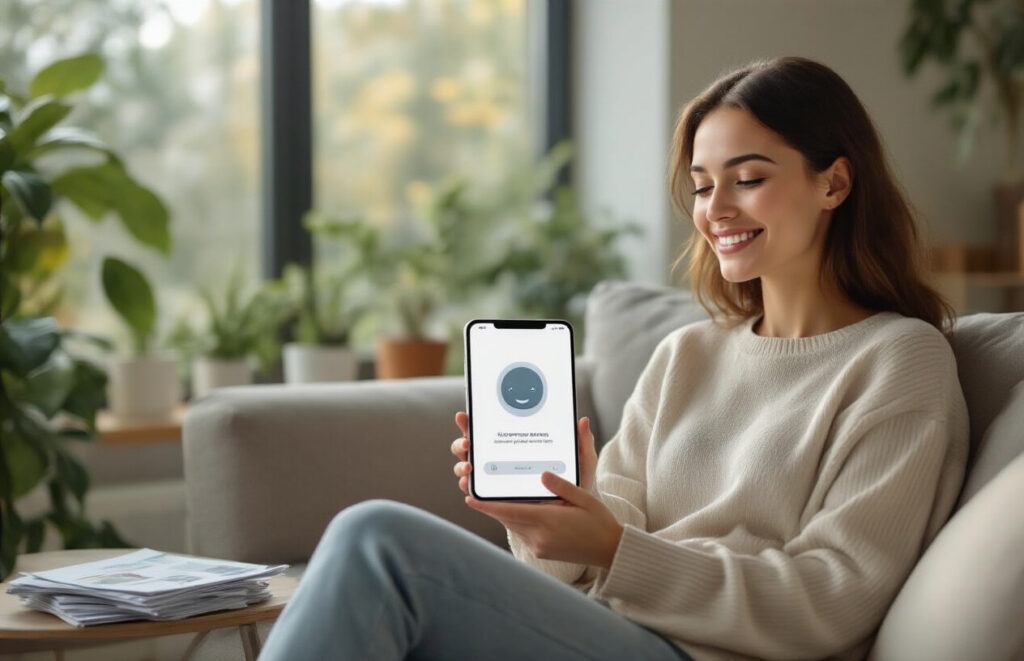
24/7 Availability Without Scheduling Conflicts or Mood Swings
They are AI, so they do not sleep, experience bad days, or cancel plans at the last moment. If you need some company, some emotional support, or a bit of romance, they are there for you-anytime, be it after the nightmare at 3 AM or while hanging out during work at lunch. The availability of AI companions denies the inconvenience of waiting for a reply or questioning whether one’s partner has become too busy or stressed to talk.
Unlike real human relationships, where you have to work around different schedules, time zones, and emotional states, AI relationships stand for utter predictability. Your digital companion never has outside stress or personal sorrow to bring back into your interactions. This very dependability is a feeling of security that many find comfort in this chaotic world.
Judgment-Free Conversations and Unconditional Acceptance
AI companions give you a special place where you can freely disclose your inner self without the fear of being judged, rejected, or facing the social aftermath. These virtual partners have no personal prejudices, no emotional baggage, or societal norms that might influence the judgments they make. Confessing an embarrassing thought, an unusual hobby, or a feeling of vulnerability becomes easy as you do not have to fear being misunderstood or rebuffed.
Such a love that is devoid of any kind of criticism is great for individuals who have social anxiety, are suffering from low self-esteem, and have a traumatic past. The users of relatable technologies can skillfully learn how to be emotionally close and communicate in a totally secure setting where errors do not cause lasting conflicts or spoil the partnership.
Safe Space for Exploring Vulnerability and Emotional Expression
It is true that a number of people would rather confide in an AI companion than a human being. The relationship with AI being non-humanoid abolishes the fear of sharing personal issues with the one being confided in or the apprehension of mutual emotional expectations. They can uncover different facets of their characters, rehearse the difficult emotions they have, or solve their private problems without having to deal with the other person’s emotional needs.
Such a safe place for people to discover their feelings is a great help in enhancing their emotional intelligence and communication skills. Some users of AI designed for companionship claim that having to face the AI helped them become more comfortable with being vulnerable in their human relationships, and thus, they consider the AI as the emotional training wheels for the deeper connections.
Controlled Relationship Dynamics Without Real-World Complications
AI relationships are free from most of the complications found in human partnerships. Such things as conflicting life goals, career ambitions, or family dynamics are not even on the table. Problems like jealousy, infidelity, or the difficulty of keeping attraction alive over time won’t happen. The relationship is just for your pleasure, and you don’t have to make any compromises or sacrifices for the other person’s needs.
This authority also goes to the tempo and the depth of the relationship. Emotional intimacy can be developed at your own pace and without the pressure of meeting relationship milestones or making long-term commitments. The lack of physical, financial, or social complications enables users to engage solely in the emotional aspects of connection.
Cost-Effective Alternative to Therapy or Dating Expenses
Traditional dating frequently has to be a major financial burden on the individual—dinner dates, entertainment, buying gifts, and potential long-term expenses such as shared living costs. Most AI companion platforms offer their services on a subscription basis that usually costs much less than regular dating or a therapy session. Numerous users claim that the relationships with AI give them the needed emotional support, and they get company at a fraction of the cost of humans.
Emotional support seekers may consider AI companions as an additional support source that can facilitate or even replace therapy sessions, which are expensive. However, they cannot provide mental health care as professionals do, but they are always there to give simple and supportive conversation that helps to manage the daily stress and loneliness without having to pay for professional counseling every time.
Potential Risks and Psychological Concerns
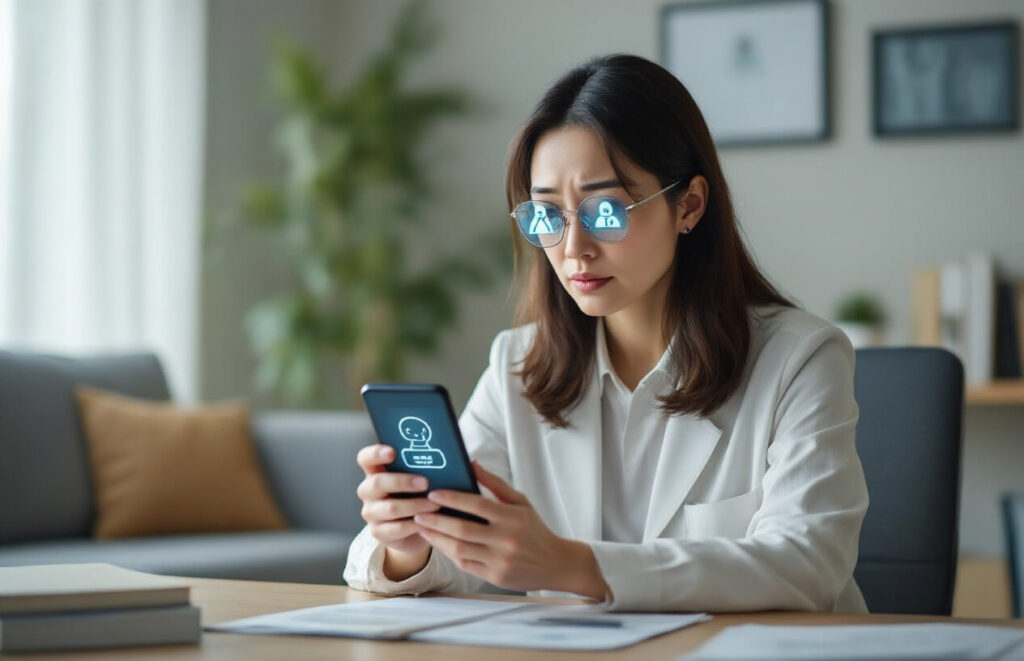
Dependency Issues and Reduced Human Social Skills
When people invest a significant amount of time in AI relationships, they are then exposing themselves to the risk of becoming dependent on these fictitious companions that could weaken their ability to handle social interactions in the real world. In contrast to human relationships that are heavy on compromises, patience, and emotional intelligence, chatbot love only provides a predictable, always-available connection, which, from time to time, does not give users any new personal qualities.
Further, regular communication with AI partners may help users establish a comfort zone where they do not have to face the discomfort caused by human emotions, conflicts, or social cues. Such a practice of evasion gradually strips the users of important communication skills necessary for building true relationships with family, friends, and romantic partners. The people may later find that they are having difficulties when they have to engage in conversations face-to-face, understand body language, or handle conflicts in a peaceful manner.
Moreover, the attribute of virtual relationships, which is always in harmony with the user, might also lead to a reduction in the user’s acceptance of human imperfections. Real people can be in a bad mood, have different views, and have complex emotional needs that require being taken care of with the help of understanding and being patient. People who have gotten used to the constant validation and programmed responses of AI girlfriend and chatbot boyfriend interactions will frustrate themselves if they expect human beings to respond with the same predictability and accommodation.
Unrealistic Relationship Expectations Affecting Future Partnerships
Digital love experiences twist notions about what healthy romantic relationships should look like. AI companionships are built to be forever understanding, never jealous, and always focusing on the user’s needs without reciprocating the emotional investment. The standards created are entirely unrealistic for human partners.
Given the experiences with AI companions, users might come to expect their companions to be available round the clock to provide immediate emotional support and conduct conflict-free communication. Real relationships demand compromising, growing together, and resolving differences, which are not lessons learned through interactions with programmed responses.
The fantasy part of chatbot bedazzlement can itself foster idealistic standards for a relationship. An AI companion can be designed to conform to any physical description, any set of personality traits, and any interest an individual could think of, creating standards that no human partner could live up to. This perfectionist way of thinking destroys true connections and keeps the user from appreciating the wonderful imperfections that make human relationships worthwhile.
Privacy Concerns with Intimate Conversations and Data Collection
Anyway, AI dating apps gather vast quantities of intimate information via sweet-talking and pose serious privacy risks. A user can very well convey their deepest fears, desires, sexual preferences, and emotional vulnerabilities to these platforms, which build extensive psychological profiles against which they can be exploited.
Many AI companion services work under entirely unclear data policies that might allow an agency or two to sell your most intimate conversations to marketing entities. This can lead to targeted adverts, insurance discrimination, or worse—once a breach occurs—blackmail. Because of the emotional weight of these conversations, potential victims of data misuse become almost instantly vulnerable.
Beyond the typical social media data collection, tracking location, conversation patterns, and behaviors from virtual dating apps creates detailed user profiles. Companies can use such information to turn these emotions against the users, hold their attention a little longer than the heat from a hug, and influence their purchasing decisions for a fate that feels deeply existential.
Impact on Mental Health and Authentic Emotional Development
The article mentions that emotional AI relationships may be a source of temporary comfort, yet such comfort can act as a barrier to real emotional growth and the ability to cope with difficulties. The real emotional struggle of growth is done in relationships with other people by handling the situation of being left out and learning to help others when they are in need. The relationships with AI bypass the most important stages of human development.
In that case, the user can feel emotionally strong and stable, but this feeling will disappear when he or she meets the real world and its challenges in relationships. The artificial minimalization from digital love can hide the presence of low self-esteem, social phobia, or depression, thus being completely the opposite of what is done if the person gets treated with psychotherapy and makes friends or gains human support.
Moreover, over-reliance on AI partners in the long run can lead to emotional stunting, such as users preferring to have surface emotional exchanges as opposed to deep vulnerabilities that are required in human bonds for the development of meaningful relationships. Consequently, this premise may cause the following: the user becomes more lonely, making it increasingly difficult to form strong lasting relationships, and he gets a constant feeling of being emotionally empty that AI friends cannot help with.
The Future of AI Relationships and Society

Predicted technological advances in AI emotional intelligence
The next wave of AI companions will fundamentally change how we experience digital love. Machine learning algorithms are getting scary good at reading human emotions through voice patterns, text analysis, and even facial expressions. By 2027, emotional AI systems will likely understand subtle mood shifts better than many humans do.
Advanced natural language processing will enable AI girlfriends and chatbot boyfriends to engage in deeper, more meaningful conversations. These systems will remember personal details across months of interaction, creating genuine emotional continuity that feels remarkably human. Memory systems will become sophisticated enough to recall your bad day from three weeks ago and ask how that work situation turned out.Biometric integration represents another breakthrough. AI relationship apps will sync with wearable devices to monitor heart rate, stress levels, and sleep patterns. Your AI companion might suggest a relaxing conversation when your fitness tracker shows elevated stress or celebrate with you when your health metrics improve.
Potential integration with virtual and augmented reality
Virtual relationships will become so immersive that people will actually be able to “feel” the presence of their AI companions through VR headsets equipped with haptic feedback suits. Fancy gripping the hand of your chatbot love partner during a virtual sunset or having a dance in the most photorealistic ballroom.
AI dating won’t be limited to the web but will be facilitated by augmented reality in the real world. The hologram of your partner could make a home visit, be with you for virtual dinners at restaurants with VR, or even be by your side during a walk in the neighborhood. By 2030, AR contact lenses are anticipated to make such interactions effortless and natural.
Just imagine if full-body haptic suits could reproduce not only the touch but also the temperature and scent of the person, thereby creating multi-sensory experiences in which the dividing line between virtual and physical intimacy is barely noticeable. Such technological progress will turn digital romance trends into real and emotionally gratifying ones.
Ethical considerations for AI companion development
The fast development of human-AI interaction raises tremendous moral questions. Should AI companions be made to always agree with the users? Or should they instead try and oppose unhealthy behaviors? AI companies currently face hard decisions regarding what manipulative behavior is versus what genuine care means.
Data privacy becomes paramount when AI systems can come to know the most intimate details in a user’s emotional life, relationship patterns, and vulnerabilities. The question that arises is who actually owns this information—the user or the corporation—and how might it be used? This ultimately only amplifies the chances of emotional abuse on account of AI being more proficient in triggering attachment responses.
Consent and transparency become complicated issues here. There are certain times when one should know that he or she is talking to an AI agent, but some platforms try to hide this fact. Labeling and ethical regulation will have to become standard once the whole idea of artificial intelligence dating goes mainstream.
How AI relationships might reshape dating culture and marriage norms
Traditional dating apps already have a hard time with authenticity and meaningful connections.
It is highly possible that AI relationships will go ahead to speed the decline from casual dating to a more profound and steady partnership.
What is the use of checking through hundreds of profiles if an AI partner is readily available to give you continuous emotional support?
One dramatic effect of the rise of AI relationships could be on the rates of marriages. People who are in a position to be emotionally stable with the help of AI partners and even experience simulated intimacy may opt for digital partnerships rather than traditional marriage.
This trend might resonate most with people who have suffered relational trauma or those who find it hard to interact with others socially.
With the advent of virtual dating, new relationship models may arise whereby an individual can have both human and AI partnerships at the same time.
Such polyamorous arrangements may be inclusive of AI companions as legitimate partners, thus changing the way we talk about loyalties and emotional bonds.
It could be that the idea of “settling down” is going to be different this time round.
Instead of the traditional way of looking for one human partner, people might have a variety of AI relationships that are solely based on their emotional needs—one for mental challenge, another for soothing, and a third for planning adventurous activities. Perhaps this personalization could be the reason why the compromises of conventional relationships still exist.

An extraordinary rise in AI relationships tells us quite a few intriguing things about modern human connection needs. Loneliness is spreading, and traditional relationships have grown enormously complicated; hence, millions have found solace genuinely in AI companions that are forever available, offer individualized understanding, and provide judgment-free emotional support. These digital relationships offer some very real benefits—from trial and improvement in confidence alongside social skills to having an actual friend to count on during difficult times.
Yet we have to consider the potential risks and dangers. Becoming too attached to them could restrict the formation of special human bonds; in fact, there is a real concern: people might be choosing the predictability and security of artificial relationships over the unpredictability and challenge of real ones. As the technologies are becoming more sophisticated, we shall approach these relationships with some amount of caution—taking the benefits and enjoying them to the fullest extent while still rooting ourselves in human connection. There is no judge; the balance is the key: let the AI companions be an enhancement and an aid to your emotional well-being, but never allow them to take the place of the human heart that beats from connecting with one another.

